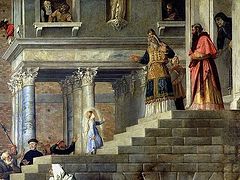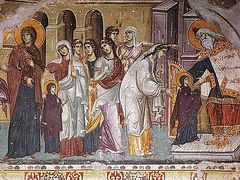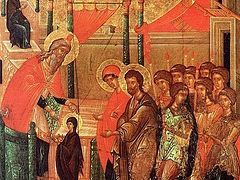In the name of the Father, the Son, and the Holy Spirit!
We gather together in church many times a year on the feasts, and we often fail to think about what these feasts mean to each one of us. Today we remember the Entrance of the Most Holy Theotokos into the Temple, and bow down before the Most Holy Mother of God. But it is extraordinarily important to also remember that every divine feast is a reminder and renewal of God’s promises for each person who is faithful to Him, for each person who believes in Him and strives to keep His commandments, for everyone who considers himself a disciple of Christ and lives as such. What promises does the Lord give us?
On Pascha we remember God’s promise to resurrect after death each person who believes in Him, and to give him eternal life that is divine and abundant—a life about which the apostle Paul says: Eye hath not seen, nor ear heard, neither have entered into the heart of man, the things which God hath prepared for them that love him (1 Cor. 2:9). On the feast of the Meeting of the Lord, we are reminded of God’s promise, and the Lord confirms this promise once more, that this meeting with God is possible for any person. And what promise does the Lord give us through this feast of the Entrance of the Theotokos into the Temple? We have come to church to worship Him and hear something from Him that is very, very important. We know how this feast was established, what event it honors. But we also remember the most important thing: The temple of God is man himself. Each of us is foreordained to be the temple of God. And the Most Holy Theotokos fulfilled this service and fully received this joy of God’s promise. She herself entered the Temple, she abode in the Holy of Holies, she was filled with grace, and she herself became a temple of God, into which the Lord came and abode. Here are the astounding words of the Dogmatikon, first tone, which we often hear during divine services: “Today the Mother of God is shown to be heaven and the Temple of God…” She herself became Heaven, a spiritual world, and the temple of the Divinity. The Lord came to dwell in her according to God’s promise that man can and should, and in fact is preordained to be a true temple of God. This temple in which we are today is an icon of the Kingdom of Heaven, of the spiritual world, and of us ourselves.
Let’s remember these promises of God to those who are faithful to Him. Here is what the Lord Himself said: If a man love me, he will keep my words: and my Father will love him, and we will come unto him, and make our abode with him (Jn. 14:23). And listen to what the apostle Paul asks us: Know ye not that ye are the temple of God, and that the Spirit of God dwelleth in you? (1 Cor. 3:16). What? know ye not that your body is the temple of the Holy Ghost which is in you, which ye have of God, and ye are not your own? (1 Cor. 6:19) God, Who loves mankind, boundlessly gives Himself wholly to man, like a father or mother. A father and mother want nothing greater than to give all their experience, mind, and love over to their child—to as if come and abide in him, so that the child would possess all those spiritual treasures of wisdom, feelings, and love that the parents have. If the father or mother were able, they would dissolve all their best qualities into their child. This is close and understandable to every parent. So it is with the Lord God. He wants to unite with every person and give His infinite treasures to all who are His children, for He has created them. And we call God our Father.
This is the calling that is foreordained for every person. But we know from experience that we forget about this goal of human life; and a large portion of the people living on earth do not even think about it. Christians who love their neighbors should remember that if you recognize this, then you have a responsibility not only for your soul, not only for your life, but for all those whom you love, who abide in your souls. Because if you yourselves become the temples of the Living God, you can also contain in this temple all those whom you embrace with your love—even people who don’t go to church and are not religious. And space will be found for them according to the love and Providence of God in that unity of man and God, to which the Lord has foreordained for this world. And it will be better for them! We don’t know how, but we believe that every prayer and all our love for our neighbors—every neighbor—is love that the Lord Jesus Christ Himself commanded us to have; and this love, labor, and exaltation of the human spirit in obedience to the will of God will not be in vain, even for people who are entirely unbelieving. The Lord commanded us to love everyone, and He commanded this not just for the sake of making a commandment, but because we are the instruments of the world’s salvation, the instruments of God in this world. And when a person is vouchsafed to even partially perceive that he is the temple of God, that God lives in him, then he understands what the Savior’s words mean: The Kingdom of Heaven in within you.
If a person becomes the temple of God, if God abides in him, then the whole universe abides in him. St. Ignatius (Brianchaninov) once expressed it beautifully. I am not citing him word-for-word, but closely: “Do not get enraptured, O man, with visible nature. Do not contemplate its infinite beauty. Delve into your own soul, and there you will see an amazing sight. There you will see first the grave and hell to which your passionate soul is destined. Then you will see the Cherubim who guard the gates of Eden, the Kingdom of Heaven. You will see the Heavenly Kingdom itself. And this sight will distract you from the whole world.” Not because we are supposed to be distracted, but because this contemplation is infinitely higher, more meaningful, and more beautiful than the contemplation of the whole world. We are called by God to contain our Lord in ourselves. We are called by God to know eternal life and become its true participants. And the temple of God, the Mother of God, leads faithful Orthodox Christians precisely along this path that she herself walked, through God’s grace. All of this is established to attain this goal, and this goal is our very salvation. But if something goes wrong, if man disdains this promise made by God and says, “I don’t need this,” then he destroys his own temple, he destroys the temple of his soul. And the Lord warns all mankind about this. It may be terrifying but it is also God’s promise: If any man defile the temple of God, him shall God destroy; for the temple of God is holy, which temple ye are (1 Cor. 3:17). Do ye think that the scripture saith in vain, The spirit that dwelleth in us lusteth to envy? (1 Jas. 4:5). But if a person does not respond in any way to God’s love, the love about which we are talking to you now, then God departs from him and leaves him alone with himself and the devil, whom that person loved more than God in his life. And then that terrible thing happens about which the apostle Paul spoke in the above passage from Holy Scripture.
We shall all pray today to the Most Holy Sovereign Queen, our Theotokos, who like no one else fulfilled this goal of human life to its fullest extent. She entered the temple of God, received all from it that it is possible to receive, and herself became heaven and the Temple of the Divinity. We are all created with this destiny. But the most amazing thing is that we are destined for even more than that. Such is God’s love for people! How do we know this? In Holy Scripture are the remarkable words that we have heard in today’s Gospel reading. A certain woman of the company lifted up her voice, and said unto him, Blessed is the womb that bare thee, and the paps which thou hast sucked (Luke 11:27). And the Lord replies that even more blessed than the Most Holy Theotokos, than her, who carried Him in her womb and nursed Him, are they that hear the word of God, and keep it (Luke 11:28).1 These mysterious words are even more remarkable. They are beyond our comprehension. But we can understand the love of God, Who so loves people that He prepared even greater blessedness for them than for His own earthly Mother. I repeat, these words are beyond our comprehension, but they were pronounced, and this is also the Lord’s promise. How wonderful it is if one should accept this, and how terrible it is if one should pass it by. May the Lord save you.




